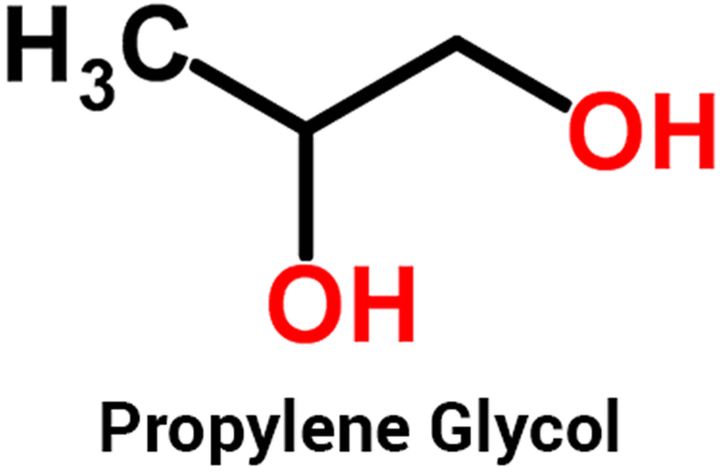


Propylene glycol is a synthetic liquid widely used as an additive in various products due to its unique properties. This article explores its chemical nature, applications, safety considerations, and future prospects.

Propylene glycol is a clear, odorless, and slightly sweet liquid classified as a diol (an alcohol with two hydroxyl groups). Its hygroscopic nature and miscibility with water and organic solvents make it a valuable additive in many industries.
| Property | Value |
|---|---|
| Chemical Formula | C3H8O2 or CH3CH(OH)CH2OH |
| Molecular Weight | 76.09 g/mol |
| Physical State | Liquid |
| Appearance | Clear, colorless, odorless |
| Taste | Slightly sweet |
| Density | 1.036 g/cm³ (at 25°C) |
| Boiling Point | 188.2°C (370.8°F) |
| Melting Point | -59°C (-74.2°F) |
| Solubility | Miscible with water, alcohols, and many organic solvents |
| Viscosity | 54 mPa·s (at 25°C) |
| Hygroscopicity | Hygroscopic (absorbs moisture) |
Propylene glycol is produced by the hydrolysis of propylene oxide, a relatively environmentally friendly process as the compound is biodegradable and has low bioaccumulation potential.
Propylene glycol's versatility stems from its unique properties, making it useful in various industries:
Food and Beverages: Used as a solvent, preservative, and moisture-retaining agent in foods, beverages, and food colorings.
Pharmaceuticals: Acts as a solvent, vehicle, and preservative in oral, topical, and injectable medications.
Cosmetics and Personal Care: Functions as a humectant, solvent, and viscosity controller in cosmetics, shampoos, lotions, and personal care products.
Antifreeze and Deicing Fluids: Lowers the freezing point of water, making it useful in antifreeze formulations and aircraft deicers.
Electronic Cigarettes: A primary ingredient in e-cigarette liquids, producing the vapor-like aerosol.
| Industry | Applications |
|---|---|
| Food and Beverages | Solvent, preservative, moisture retention, food colorings |
| Pharmaceuticals | Solvent, vehicle, preservative for oral, topical, and injectable medications |
| Cosmetics and Personal Care | Humectant, solvent, viscosity controller |
| Antifreeze and Deicing Fluids | Freezing point depression for antifreeze and aircraft deicers |
| Electronic Cigarettes | Vapor production in e-cigarette liquids |
While generally recognized as safe (GRAS) by the U.S. FDA for use in food and pharmaceuticals, excessive exposure or ingestion can cause adverse effects like nausea, vomiting, and potential kidney issues. Proper handling and usage within recommended limits are advised to ensure safety.
Regulatory bodies like the FDA and European Union have established guidelines and concentration limits for propylene glycol's use in various products.
Hygroscopicity and moisture retention
Solubility and miscibility with water and organic solvents
Ability to lower the freezing point of water
Odorless and slightly sweet taste
Low toxicity at recommended levels
Researchers are exploring propylene glycol's potential in emerging fields like biotechnology, nanotechnology, and renewable energy. Additionally, efforts are underway to find sustainable and renewable sources for its production, as well as potential alternatives and substitutes.
Propylene glycol's versatile properties make it an invaluable additive across various industries. While generally safe, proper handling and usage are crucial. With ongoing research and development, this remarkable compound's applications continue to expand, solidifying its position as a truly versatile and indispensable additive.
Propylene glycol is generally considered safe, but excessive exposure or ingestion can cause adverse effects like nausea, vomiting, and potential kidney issues. Proper handling and usage within recommended limits are advised to ensure safety.
Yes, propylene glycol is biodegradable and has low bioaccumulation potential, making it relatively environmentally friendly.
Propylene glycol is primarily produced by the hydrolysis of propylene oxide, a relatively environmentally friendly process.
Yes, propylene glycol is recognized as safe (GRAS) by the U.S. FDA for use in food and beverages as a solvent, preservative, and moisture-retaining agent.
In the pharmaceutical industry, propylene glycol acts as a solvent, vehicle, and preservative in oral, topical, and injectable medications.
Propylene glycol is a primary ingredient in e-cigarette liquids, where it produces the vapor-like aerosol.
Propylene glycol lowers the freezing point of water, making it useful in antifreeze formulations and aircraft deicers.
Yes, propylene glycol is hygroscopic, meaning it absorbs and retains moisture, which contributes to its use as a humectant in cosmetics and personal care products.
Regulatory bodies like the FDA and European Union have established guidelines and concentration limits for propylene glycol's use in various products to ensure safety.
Yes, researchers are exploring sustainable and renewable sources for propylene glycol production, as well as potential alternatives and substitutes, to address environmental concerns and resource depletion.

Miguel started tinkering with car radios as a teenager, fascinated by the intricate dance of wires and circuits. This passion led him to pursue a career as an automotive electrician. For the past 10 years, Miguel has tackled everything from flickering headlights to mysterious electrical gremlins. He thrives on troubleshooting electrical problems and enjoys sharing his knowledge to empower car owners to understand their vehicles better.








